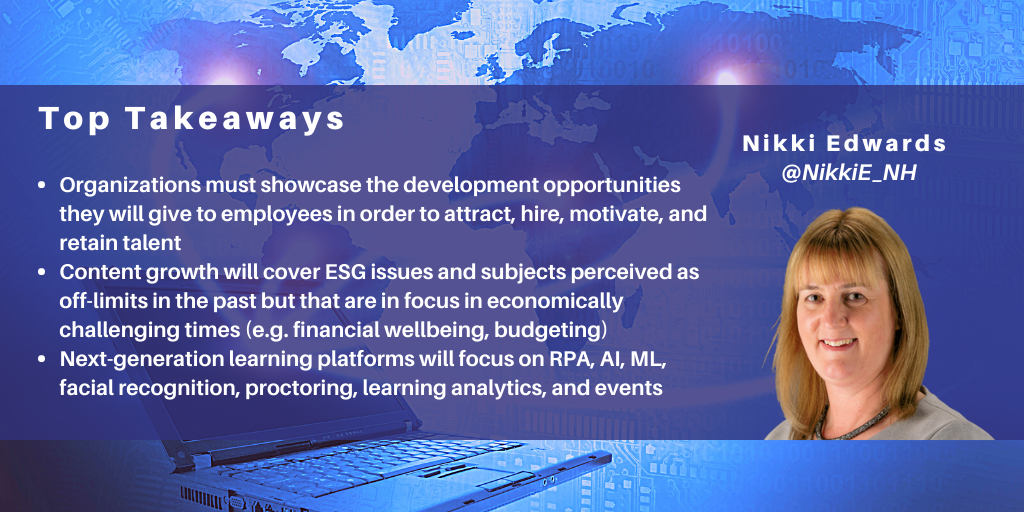posted on Feb 01, 2023 by Nikki Edwards

In 2022, timely digital learning became the accepted norm, along with personalized learning using delivery methods based on the latest advances in learning tech and services.
Before the pandemic, learning was a target for wholesale budget cuts during a time of economic uncertainty. With ongoing talent and skills shortages, 2023 will likely see some organizations de-prioritize learning, while others will prioritize mission-critical learning to offset talent acquisition (TA) challenges, where building skills is a viable alternative to hiring skills.
Hot topics in the learning space for 2023 include:
Personalized learning journeys
An excellent learner experience, and broader employee experience, indicates a nurturing company culture where people feel valued and remain engaged. Organizations must showcase the development opportunities they will give to employees in order to attract, hire, motivate, and retain them. Learning functions need to understand their employees’ existing skillsets, identify those they need for future business success, and identify the skills gaps to create fit-for-purpose personalized learning journeys.
Skills gap analysis is not new, but in 2023 it is disappointing that so many organizations have never undertaken this fundamental task; and this is highly indicative of why learning often fails. Many platforms now have skills ontologies built in, with RPA/AI to help drive tailored learning according to role requirements and skills interests. Platforms also support various learning modalities (video, animation, quizzes, cohorts, etc.) to engage learners, whatever their preferred learning styles, experience level, and formats (mobile, bite-sized), to provide anytime/anywhere/any device experiences. Ultimately, the aim is to motivate learners to curate their own tailored learning content, giving them the drive to own their learning/career plan while promoting a strategic and career-long learning culture within organizations.
Engaging and relevant learning content
There will be a burgeoning variety of learning content in 2023, building upon what evolved over 2020-2022. Organizations can choose whether to curate third-party content or create bespoke content, either outsourcing the task or self-creating it using authoring tools. Content around digital skills, the future of work skills, financial and mental well-being, resilience, and DEIB will continue to be in demand.
2023 will see content growth covering ESG issues and subjects that may have been perceived as off-limits in the past but come to public attention in economically challenging times (financial well-being/budgeting, healthy eating on a budget, and domestic issues, for example). Learning content is becoming life-centered, not purely work-centric, reflecting the nurturing ‘sense-of-belonging’ work cultures that organizations aspire to provide.
Learning tech/tools
Building on 2022 progress, next-generation learning platforms will emerge in 2023, providing hyper-personalized learning experiences: LMS, LMXP, LXP, and specialty platforms. Where vendors have acquired other learning tech companies, those new platforms will encompass the best features and functionality. RPA, AI, ML, facial recognition, proctoring, learning analytics, and events are just some of the focus areas.
Appification is growing, notably in bite-sized content authoring and video tech, to expand the capacity to use tech anywhere and anytime within busy schedules. While economic uncertainty looms, 2023 will likely see organizations delay large-scale learning tech purchases to minimize spending, choosing to make do with existing platforms and augmenting parts of their ecosystems with appropriate tools for specific purposes.
Enterprises may consolidate learning tech, if they have various platforms in play, to streamline learning. The appetite for data/analytics on learners will grow as organizations recognize the benefits such insights have brought to other areas of their business such as recruitment. Insights will expand beyond learners’ use of learning platforms to focus more on learner behaviors, the predictive assignment of content, and capturing the volume of content views and reactions by learners. This will enable organizations to optimize their learning content and technology investments.
Changing learning roles
Learning and learning technology advancements over the past decade have influenced and transformed L&D roles. Moving into 2023, L&D engagement will focus on addressing critical organizational issues such as developing and sustaining required skill sets. Initial job and task analysis, curriculum design, and functionally-focused career-long learning journey development projects will be necessary to ensure learning remains aligned with organizational strategies. As the application and use of HR and learning data analytics become more prevalent, demand for data science jobs and skill sets will increase.
For full coverage of the learning market, find out more by following the link below; and to subscribe, contact Guy Saunders.
Learning Services: https://research.nelson-hall.com/sourcing-expertise/hr-services/learning-bps/




